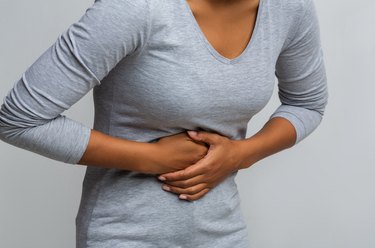
Some types of gastritis are particularly damaging to the stomach lining, causing irritation and possibly ulcers if not treated. Your diet may worsen gastritis symptoms such as heartburn, bloating and nausea. Here's what you need to know about what to eat and what to avoid when you have gastritis.
Read more: Breakfast Diet for Gastritis
Video of the Day
Video of the Day
What Is Acute Gastritis?
"Gastritis is a broad term referring to inflammation of the stomach. It can occur for a variety of reasons, all of which are treated differently," explains Hardeep M. Singh, MD, a gastroenterologist with St. Joseph Hospital in Orange, California. "A common cause of gastritis is acid over-secretion," he adds. "This is typically treated with antacids such as histamine blockers or proton pump inhibitors."
The National Institute of Diabetes and Digestive and Kidney Diseases (NIDDK) reports that nearly 35 percent of people in the U.S. are infected with Helicobacter pylori (H. pylori), making it one of the most common causes of gastritis. Also, nearly everyone infected with H. pylori will develop chronic gastritis.
According to Harvard Health Publishing, Cleveland Clinic and NIDDK, gastritis can also result from smoking, alcohol use, ingesting a toxic substance, food allergy, taking nonsteroidal anti-inflammatory drugs (NSAIDs) or bacteria other than H. pylori.
Whatever the cause, acute gastritis comes on suddenly. If the cause of the gastritis isn't addressed, the inflammation can become chronic and long-lasting, according to the National Center for Biotechnology Information (NCBI). Treatment is especially important when the cause is H. pylori as this gastritis can linger indefinitely and increases the chance of stomach cancer.
Gastritis Diet Don’ts
As part of addressing inflammation in the stomach lining, your doctor may recommend dietary changes to calm things down and reduce the risk of worsening symptoms. "In general, when there is inflammation of the stomach, we ask patients to avoid any dietary irritants," says Dr. Singh. Spicy foods, alcohol, food and beverages containing caffeine and foods that are naturally acidic, like citrus, are among the food choices that may cause stomach irritation.
According to the NCBI, certain foods can literally feed chronic inflammation. These include excessive amounts of saturated fats, trans fats and refined sugars, so limit foods that fall into these categories — dishes heavy on fatty meats, butter and cheese as well as sweets and sodas.
Dietary Choices That May Help
A diet that helps you maintain a healthy weight is important for managing gastritis symptoms because excess fatty tissue secretes substances that can cause inflammation. But what foods should you include?
A scientific review, published in June 2019 in the Journal of Nutrition and Metabolism, suggests it may beneficial to consider a diet with foods known for their anti-inflammatory properties — specifically, a diet rich in plant-based foods that are high in anti-inflammatory compounds, such as polyphenols and other phytochemicals.
These compounds have been shown to act as a buffer to exposure to toxins and other environmental pollutants that can cause or worsen inflammation. The review highlights red fruits and vegetables because they contain high amounts of antioxidants and unique carotenoids with anti-inflammatory properties.
Many red fruits and vegetables also have considerable amounts of vitamin C, which has been shown to reduce inflammation as well as bolster the immune system, the study points out. Consider adding beets, watermelon, red potatoes, pomegranates, red plums, red pears, strawberries, raspberries and apples to your weekly menu.
Other good anti-inflammatory choices include foods rich in omega-3s, such as salmon, as well as high-fiber foods like oatmeal and whole grains, nuts, and green and black teas, according to the NCBI.
Read more: Do Bananas Aggravate Gastritis?
Another Suspect: Food Allergies
Dr. Singh recommends keeping a food journal as a tool to help identify foods that consistently cause reproducible symptoms. At minimum, this will make avoiding trigger foods easier.
It's also possible that a food journal will assist in identifying any significant food allergy that could be causing severe gastritis symptoms. "There is a rare condition called eosinophilic gastritis," notes Dr. Singh. "This can be triggered in patients with specific food intolerances, leading to severe inflammation in the stomach."
- Hardeep M. Singh, MD, gastroenterologist, St. Joseph Hospital in Orange, Calif.
- National Institute of Diabetes and Digestive and Kidney Diseases: "Definition and Facts for Gastritis & Gastropathy"
- Journal of Nutrition and Metabolism: “A Review of the Science of Colorful, Plant-Based Food and Practical Strategies for 'Eating the Rainbow'"
- National Center for Biotechnology Information: "Chronic Inflammation"
- Harvard Health Publishing: "Gastritis"
- Cleveland Clinic: "Gastritis: Could It Be the Cause of Your Bad Bellyache?"
Is this an emergency? If you are experiencing serious medical symptoms, please see the National Library of Medicine’s list of signs you need emergency medical attention or call 911.